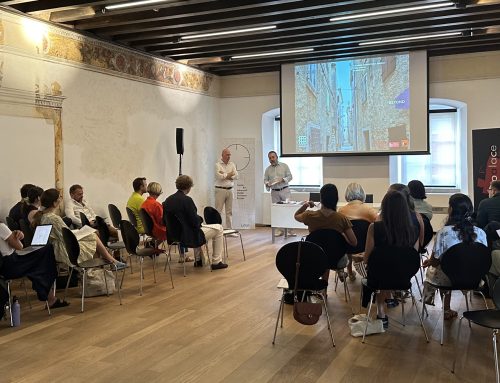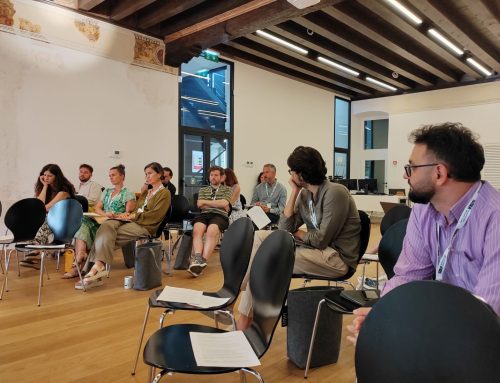The Center for Advanced Studies – Southeast Europe (CAS SEE) at the University of Rijeka is pleased to announce its annual Call for Fellowships for Autumn/Winter 2022.
The CAS SEE Fellowship Program for Autumn/Winter 2022 will host 7 Junior Fellows in total with 2 newly-initiated
“Erhard Busek Fellowship: Researchers and artists for peace and democracy”.
Dr. Erhard Busek, honorary professor of the University of Rijeka, one of the founding fathers and main driving forces behind the Center of Advanced Studies Southeast Europe (CAS SEE), and a strong supporter of Palace Moise, passed away in March 2022. Ever since the beginning of his engagement on reconnecting broken dots of the European West and East in the 1970s and 1980s Erhard Busek Erhard Busek was an indomitable advocate of freedom and democracy against all populist and authoritarian threats. In times of new threat of totalitarianism placed on a free and democratic world, CAS SEE, with support from the ERSTE Foundation, initiates the “Erhard Busek Fellowship: Researchers and artists for peace and democracy.”
Dr. Erhard Busek, honorary professor at the University of Rijeka, was one of the founding fathers and main driving forces behind the Center of Advanced Studies Southeast Europe (CAS SEE), and a strong supporter of Palace Moise. His mission was to connect people and create networks and ties between academia, researcher, civic forces, and artists. He believed in peace through education, through superiority of knowledge and enlightenment, and lived humanism. These are the core values of CAS SEE and our partners. Researchers are invited to engage in intellectual work, innovative research, and artistic practices embracing the spirit of Busek’s lifelong mission and CAS SEE fundamental values and principles. 2 “Erhard Busek fellowships” will be awarded in each call.
The Call for Applications closes on June 1st, 2022.
The 16th generation of fellows will assume their positions by October 1st, 2022.
The CAS SEE Fellowship is intended to provide support for early-stage researchers. Inspired by the cooperation of previous generations of CAS SEE Fellows and their creation of long-term thematic synergies among researchers, the upcoming CAS SEE Fellowship will stimulate fellows to present their research in Rijeka and other regional centers. Alongside pursuing their independent research interests, fellows will attend regular CAS SEE regional conferences and seminars.
Fellows are expected to spend two weeks during their fellowship on the island of Cres at the Moise Palace, a Renaissance palace managed by the University of Rijeka. The Moise Palace serves as a research retreat, a regional hub for advancing social science, humanities, art, and interdisciplinary research, and space of engagement and exchange with local communities. As in previous years, Fellows will co-organize the program for their group’s retreats to Moise based on their individual and collective interests and needs.
For applicants coming from arts, the applications should include, besides textual proposal and CV, also a 2-3 minutes of application presentation – please provide a link for the uploaded video materials in the “List up to three of your publications” slot in Application form. It is up to applicants how they want to video present their project (interview, videography, drawings etc). Lastly, please note that applicants coming from arts need not hold a PhD.
Although CAS SEE will take into account excellent proposals that are not strictly related to the main topics, we encourage candidates to focus mainly on two thematic foci:
Green Democracy – Innovations and/or Sustainability
An essential dimension in any effort to build a more just and inclusive social system pertains to environmental challenges that are ever more influencing our daily lives. However, the very complex relationships between structural pressure to increase economic growth and the structural constraint resulting from the unrestrained exploitation of resources (and the consequent threat to the environment) are often considered fragmentary and unsystematic, both in academia and within the concrete social movements. Consequently, in the public sphere one can often hear the increasingly alarming neoconservative advocation for various forms of nativism and protectionism as a “solution” for the aforementioned problem. On the more progressive side of the political spectrum, there is a consensus that more inclusive institutions and participatory political procedures are the way to go. However, a more robust and concrete discursive framing of these new institutions and procedures is, arguably, still lacking. In this respect, there has never been a more pronounced need to develop a new conceptual apparatus that would comprehensively tackle this highly dynamic issue.
This thematic focus invites researchers to apply with projects related to:
– Energy poverty, degrowth, and its applicability in the semi-periphery and periphery;
– Green-left alliances on the rise and their impact.
“Hybridity” and Resistance Strategies
A growing number of political regimes in Central/Eastern Europe, South Asia and Latin America fit into this broader picture and can be characterized as “hybrid regimes”. Based on this new “hybridity” rather resilient to outside challenges we don’t refer to hybrid regimes as simply “deficient” or “stuck” in-between old forms of authoritarianism and liberal democracy. It is rather that they stand for a dangerous (even avant-garde) new form of regimes able to adjust the disciplinary and totalizing logic of the police to the constant challenges coming from the “democracy dimension” (the logic of politics) of the political community, embodied in such principles as personal autonomy, pluralism, anti-authoritarianism and collective self-determination. These new form of hybrid regimes are no longer limited only to the “semi-peripheral” societies of global capitalism. Recent developments in the “central” states such as the success of Donald Trump in the United States and new anti-democratic regime trends in some of the member states of the EU, signal that the model of the hybrid regime is now a global phenomenon also pulsating in the “center” as well, having proven a successful way of resolving the police/democracy tension.
This thematic focus invites researchers to apply with projects related to comparative studies or case studies in successful resistance narratives towards hybrid regimes:
– Social engagement against hybridization;
– Institutional democratic designs capable of resisting hybridization.
Requirements to be fulfilled during the fellowship:
- One open-access mini digital/hybrid/physical event related to the theme of the granted fellowship. Flexible in the form, these events will have to engage representatives of the academic community, civil society, social movements and preferentially media and business community. Each event should have output in the form of a short two-page overview of the theme and conclusions aimed to the public.
- One op-ed related to the theme of the fellowship that will be distributed through web channels of CAS SEE and its partners and donors (Erste Stiftung Voices, Science for Society, European Western Balkans, Balkan Insight, etc.)
- Digital/hybrid/physical fellowship seminar and retreats participation (regular CAS SEE seminars).
- Participation in the events with prominent scholars organized by CAS SEE
UNIRI The Moise Palace: Cres Island
An education center of the University of Rijeka. A five-hundred-year-old patrician townhouse and the largest Renaissance palace on the Croatian islands. A venue and forum for various scientific and research activities, it welcomes visiting academics, students and scholars.





